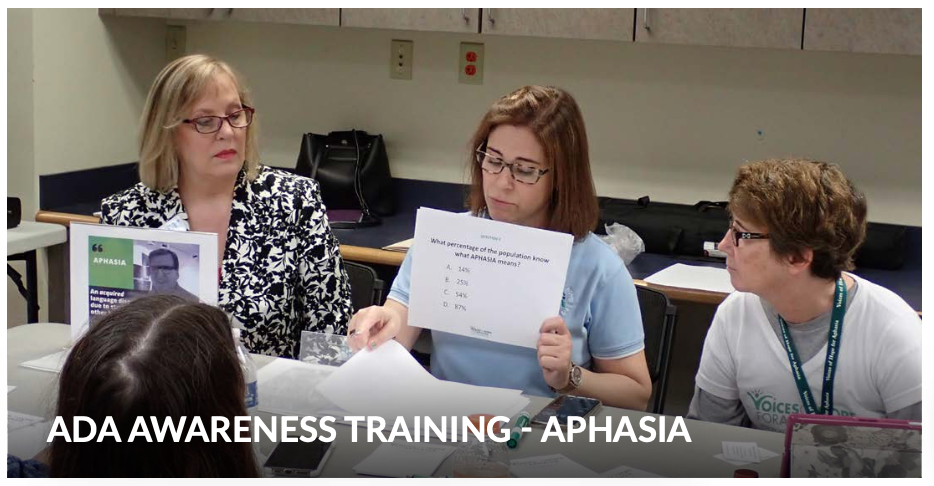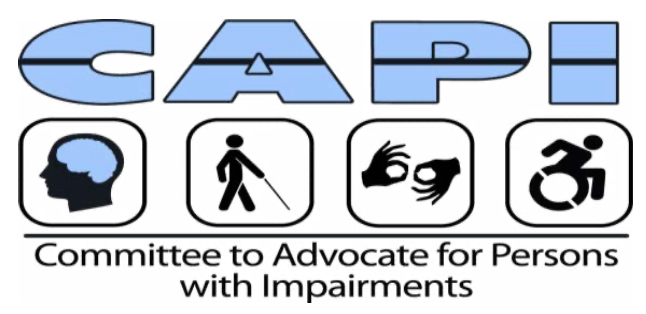St. Petersburg, FL (October 23, 2020) Debbie Yones, Executive Director of Voices of Hope for Aphasia, a 501(c)3 non-profit that supports those with a communication disorder due to stroke or other traumatic brain injury, has been appointed to CAPI, St. Petersburg’s Committee to Advocate for Persons with Impairments, by Mayor Rick Kriseman.
Established in 1972, CAPI is a group of residents appointed by the Mayor of St. Petersburg with advice and consent from City Council. The purpose of CAPI is to advocate for persons with impairments and to provide guidance to the Office of the Mayor and other city departments regarding issues related to the affairs, concerns, rights, special needs, and dignity of persons with impairments. The goal of the committee is to ensure full participation in and enjoyment of the City’s facilities, programs, and services.
“CAPI is essential to our community and I am truly honored to have been appointed to this committee by Mayor Kriseman,” says Ms. Yones. “I am grateful for the opportunity to represent and advocate for those with communication disorders alongside my colleagues advocating for physical, hearing, vision, and cognitive disabilities. I look forward to working with the other members of the committee and the city representatives to continue to make the City of St. Petersburg, a great, and inclusive, place to live!”

Voices of Hope for Aphasia has been a CAPI Community Partner for several years providing input and volunteers for the city’s Human Resources department to develop training. The modules on ADA accommodations in the workplace, which are mandatory for all city employees at a manager level or above, include a segment on the use of assistive communication devices demonstrated by a Voices of Hope for Aphasia member, Trish Hambridge. Voices of Hope for Aphasia is also a proud participant in a unique and impactful Experiential Training Workshop delivered to all city employees developed by Lendel Bright, the ADA and Diversity Coordinator, within the HR department of the City of St. Petersburg.
“We are pleased that Debbie is joining to share her commitment and dedication to our disability Community. Prior to joining she had attended and participated in CAPI Meetings, Training and Activities,” said Mr. Bright. “We welcome city residents to join CAPI, to be a part of this awesome city committee, and to carry out the cities commitment to all our residents.”
Debbie Yones will also be assigned to the Education and Training Subcommittee. This subcommittee is tasked with developing project such as New Member Orientation at the Chamber of Commerce, ADA Training and Course Research, and City Staff training.

About Voices of Hope for Aphasia: Voices of Hope for Aphasia is the only community-based aphasia center in the Tampa Bay area. Their programming is rooted in the Life Participation Approach to Aphasia which encourages and supports reconnecting people with aphasia to their lives and interests. All their programs operate on a contribute-what-you-can model ensuring that everyone can participate regardless of their financial situation. Voices of Hope for Aphasia’s staff is comprised of licensed speech pathologists who continue to receive broad industry recognition. Today, Voices of Hope for Aphasia is serving a small percentage of the estimated 23,000 people in Tampa Bay Area who have aphasia. Voices of Hope for Aphasia is a 501(c)3 nonprofit organization dedicated to promoting participation, supporting communication, and developing community among individuals whose ability to speak, understand, write, or read was affected due to stroke or other brain injury. The organization was formed in 2012 by founders Mike and Kathy Caputo after Mike’s stroke at the age of 51. Aphasia impacts over 2.4 million people in the US. There are over twice as many people living with aphasia than Parkinson’s and 150 times more than those with ALS. One in three people who suffer a stroke will have some form of aphasia and may suffer isolation, frustration, and depression due to the disorder. For more information about how our programs help on our programs – please visit https://www.vohaphasia.org
